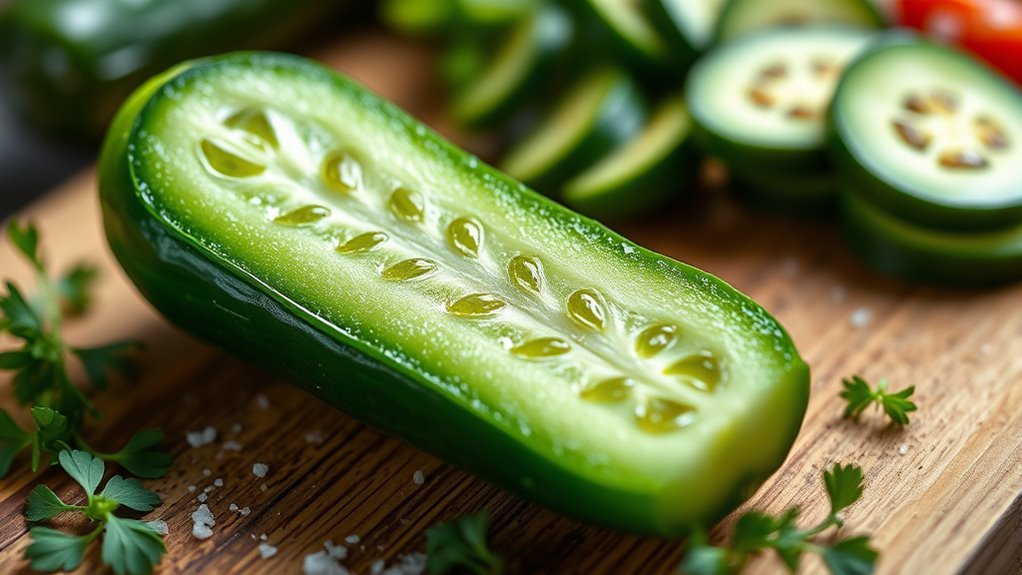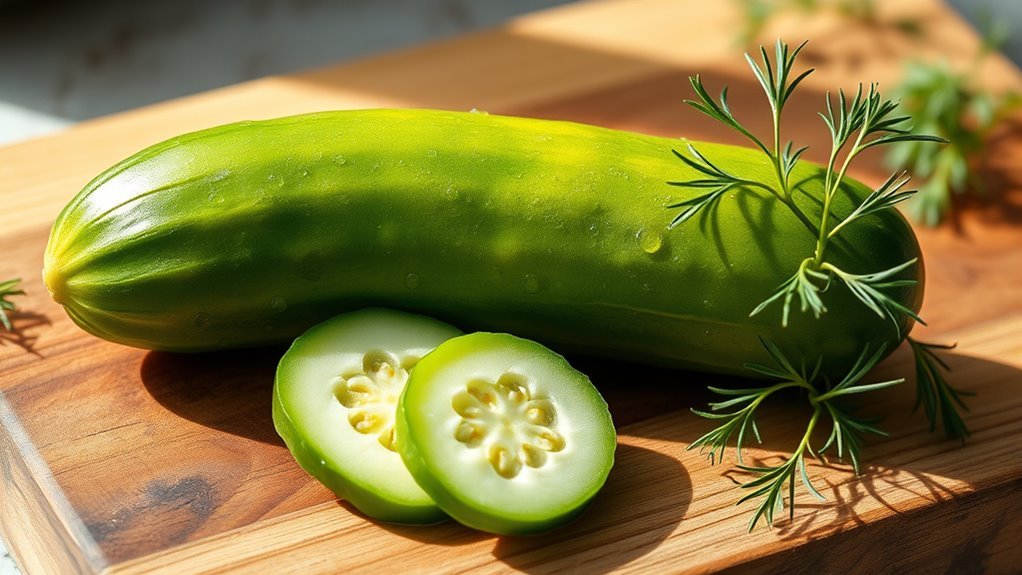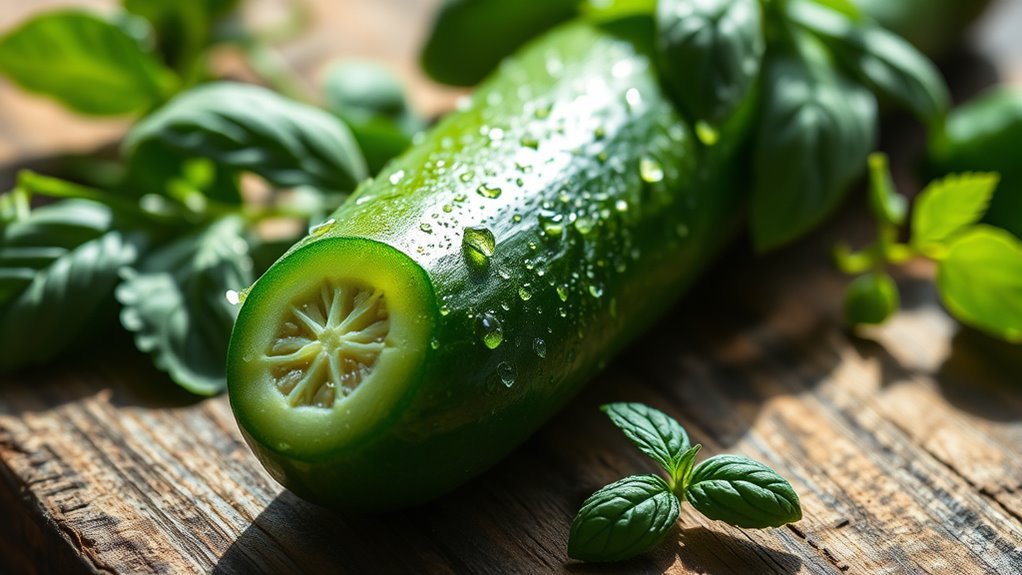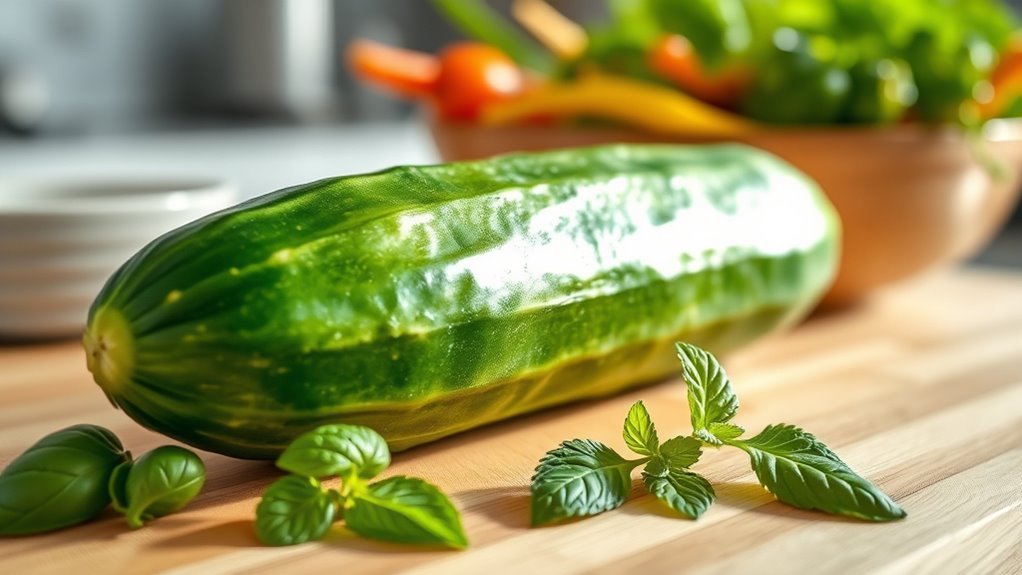Cucumbers are definitely keto-friendly! With only about 4 grams of carbs per cup, they’re a low-carb option that fits well into your meal plan. Their high water content keeps you hydrated without adding too many calories—just 16 for a medium cucumber. They’re nutrient-rich, offering vitamins K and C. However, it’s good to balance cucumbers with other nutrient-dense foods for peak health. Keep exploring, and you’ll find more creative ways to enjoy cucumbers on keto!
Nutritional Profile of Cucumbers

When you’re considering whether cucumbers fit into a keto diet, it’s essential to look at their nutritional profile. Cucumbers are low in calories and provide hydration, making them a invigorating addition to your meals. You’ll find various cucumber varieties, such as English and pickling cucumbers, each offering unique textures and flavors. Typically, a serving size of half a medium cucumber contains about 8 calories and minimal carbohydrates, making it easy to incorporate them into your daily intake. Their high water content means you can enjoy them without greatly impacting your macronutrient balance. By understanding the nutritional aspects of cucumbers, you can make informed choices that align with your keto lifestyle while still enjoying the freedom of diverse flavors.
Carb Content and Keto Compatibility

When considering cucumbers for your keto diet, it’s important to look at their carb content. With only about 4 grams of carbohydrates per cup, cucumbers can fit well into your daily carb allowance. Comparing them to other vegetables can help you make informed choices for your meal planning.
Cucumber Nutritional Profile
Cucumbers are a revitalizing addition to any diet, especially for those following a ketogenic lifestyle. They’re low in carbs and packed with nutrients, making them a perfect choice for your meals. Here’s what you should know about their nutritional profile:
- Low Carb Content: Most cucumber varieties contain about 3-4 grams of carbs per 100 grams.
- Hydration: They’re about 95% water, helping keep you hydrated while on keto.
- Nutrient-Rich: Cucumbers are a good source of vitamins K and C, along with antioxidants.
- Storage Tips: Store cucumbers in the fridge to maintain their crispness and freshness longer.
Incorporating cucumbers into your meals can enhance both flavor and nutritional value without compromising your keto goals.
Carb Count Comparison
Although many vegetables can be higher in carbs, cucumbers stand out as a low-carb option, making them highly compatible with a ketogenic diet. With only about 4 grams of carbs per 100 grams, cucumbers are an excellent choice among keto vegetables. They provide hydration and essential nutrients without greatly impacting your daily carb count. When comparing carb sources, you’ll find that cucumbers offer a invigorating alternative to starchy vegetables or grains, which can easily push you over your carb limit. Including cucumbers in your meals allows you to enjoy the freedom of variety while staying aligned with your keto goals. So, if you’re looking to keep your carb intake low, cucumbers should definitely be on your plate!
Health Benefits of Cucumbers

Cucumbers are low in calories and packed with water, making them a revitalizing choice for hydration and weight management. With about 95% water content, they can help you feel full without adding many calories to your diet. This makes cucumbers a great snack option, especially if you’re looking to maintain a keto-friendly lifestyle.
Low in Calories
When you’re looking for a low-calorie snack that still offers a revitalizing crunch, cucumbers fit the bill perfectly. With their low caloric density, they’re ideal for weight management. Here are four reasons to enjoy cucumbers:
- Minimal Calorie Count: A medium cucumber has only about 16 calories.
- Nutrient-Rich: They provide vitamins and minerals, including vitamin K and potassium.
- Versatile Snack: Enjoy them fresh, in salads, or as a dipper for your favorite keto-friendly spreads.
- Satiating Crunch: The crisp texture can satisfy your craving for something crunchy without the guilt.
Incorporating cucumbers into your diet can help you maintain your goals without sacrificing flavor or enjoyment.
High Water Content
In addition to being low in calories, cucumbers boast a remarkable high water content, making them a hydrating choice for your keto-friendly diet. With about 95% water, they provide high hydration, which can help you stay energized and support overall health. Staying hydrated is essential, especially on a ketogenic diet, where your body may lose more fluids. Cucumbers serve as a rejuvenating snack that can help prevent dehydration while keeping your calorie intake in check. Plus, their crunchy texture and mild flavor make them a versatile addition to salads or dips. Incorporating cucumbers into your meals not only enhances your hydration but also contributes to a satisfying, guilt-free snacking experience. Enjoy this low-calorie vegetable for a boost of vitality!
Ways to Incorporate Cucumbers Into Your Keto Diet
One of the easiest ways to add cucumbers to your keto diet is by using them as a low-carb substitute in various dishes. They’re versatile and invigorating, making them perfect for a keto lifestyle. Here are some tasty ways to incorporate cucumbers:
Incorporate cucumbers into your keto diet with these versatile, low-carb options for delicious meals and snacks.
- Cucumber Salads: Toss them with olive oil, lemon, and herbs for a invigorating side dish.
- Cucumber Smoothies: Blend them with spinach, avocado, and unsweetened almond milk for a nutritious drink.
- Cucumber Sandwiches: Use slices as a low-carb alternative to bread, filled with your favorite spread.
- Pickled Cucumbers: Quick-pickle them for a tangy, crunchy snack that’s easy to make.
Potential Drawbacks of Eating Cucumbers on Keto
While cucumbers are often celebrated for their low-carb profile, there are potential drawbacks to contemplate when including them in a keto diet. One concern is that their high water content can lead to frequent bathroom trips, which might disrupt your day. Additionally, if you struggle with cucumber digestion, you could experience bloating or discomfort, counteracting the benefits of this invigorating vegetable. Furthermore, cucumbers may not satisfy keto cravings for denser, more calorie-rich foods, potentially leaving you feeling unsatisfied. To maintain your freedom on keto, it’s vital to balance cucumbers with other nutrient-dense options that align with your dietary goals. Consider your body’s response and verify cucumbers fit harmoniously into your overall meal plan.
Comparing Cucumbers With Other Keto-Friendly Vegetables
Although cucumbers are a popular choice for keto dieters due to their low carbohydrate content, comparing them with other keto-friendly vegetables reveals important distinctions. You might want to explore various cucumber varieties and other vegetable alternatives to diversify your meals. Here are some great options:
- Zucchini: Low in carbs and versatile, perfect for zoodles.
- Spinach: Nutrient-dense and low in calories, great in salads or smoothies.
- Broccoli: High in fiber and essential vitamins, ideal for roasting or steaming.
- Cauliflower: A fantastic rice or mash substitute, low in carbs and high in nutrients.
These alternatives can not only complement cucumbers but also enhance your keto diet with essential nutrients and variety.
Frequently Asked Questions about Cucumber and Keto Diet
1. Is cucumber considered keto-friendly?
Yes, cucumber is considered keto-friendly. It is low in carbohydrates, with just about 4 grams of carbs per 100 grams, making it an excellent choice for those following a ketogenic diet. Additionally, cucumbers are high in water content, which helps with hydration and can aid in feeling full without consuming many calories.
2. How many carbs are in cucumber?
Cucumbers are very low in carbohydrates. A 100-gram serving of cucumber contains about 4 grams of total carbohydrates and roughly 1 gram of fiber, which means the net carbs are approximately 3 grams. This low carb count makes cucumbers a perfect addition to a keto diet.
3. Can I eat cucumber on a ketogenic diet?
Absolutely! Cucumbers can be eaten freely on a ketogenic diet. They can be used in salads, as a crunchy snack, or even blended into smoothies. Their refreshing taste and low carb content make them versatile for various keto recipes.
4. Are there any health benefits to eating cucumber on keto?
Yes, consuming cucumber on a keto diet offers several health benefits. Cucumbers are hydrating due to their high water content, which can help maintain hydration levels on a low-carb diet. They are also low in calories, making them great for weight management. Additionally, cucumbers provide vitamins and minerals such as vitamin K, potassium, and antioxidants, which contribute to overall health.
5. Can I use cucumber in keto recipes?
Yes, cucumbers can be used in a variety of keto recipes. They can be incorporated into salads, served as a side dish, or used as a low-carb alternative to bread in wraps. Cucumber slices can also be topped with cream cheese or guacamole for a delicious keto-friendly snack. Their crisp texture and mild flavor make them adaptable to many dishes.
References
- https://www.healthline.com/nutrition/foods/keto-friendly-vegetables
- https://www.medicalnewstoday.com/articles/323825
- https://www.ncbi.nlm.nih.gov/pmc/articles/PMC6520941/
- https://www.dietdoctor.com/low-carb/vegetables
- https://www.webmd.com/diet/obesity/cucumber-nutrition-facts
- https://www.cdc.gov/healthyweight/healthy_eating/fruits_vegetables.html
- https://www.eatright.org/health/wellness/healthy-living/the-benefits-of-cucumbers
- https://www.ketogenic.com/keto-diet-foods/vegetables/


